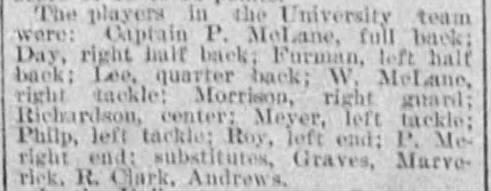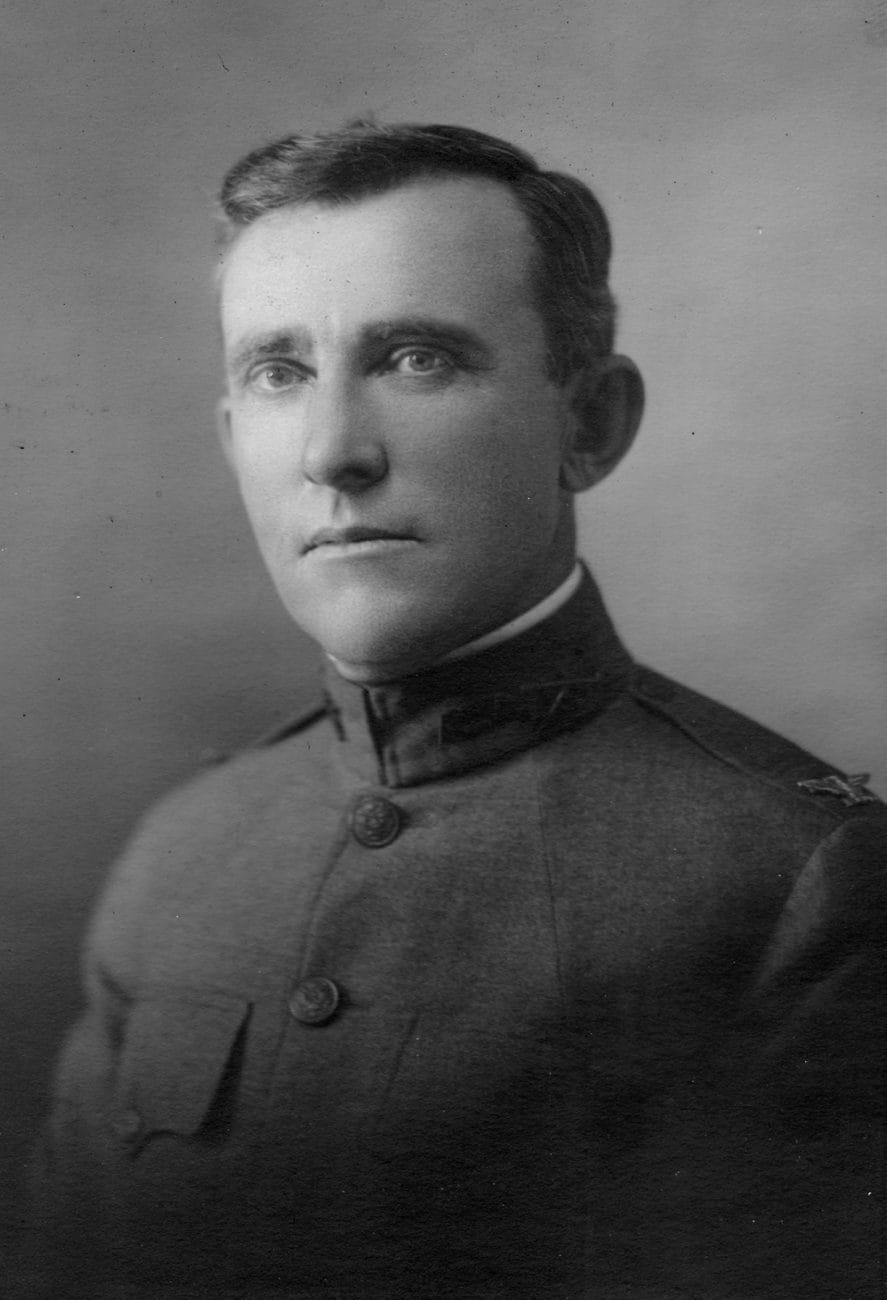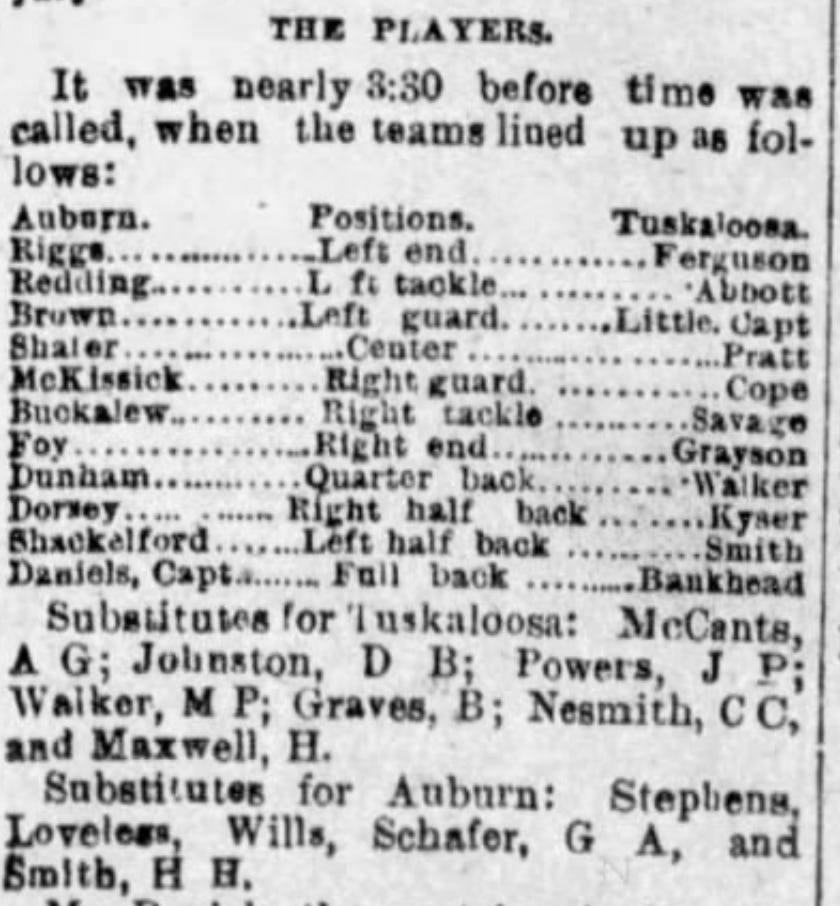Bibb Graves, Founding Member of Alabama and Texas Football
Football is a game in which individuals and teams have achieved many feats, some of which are more challenging or rare than others. Among all the feats accomplished in football history, Bibb Graves stands with the giants of obscure featdom for having been a member of the first football team at two storied college programs.
I had not heard of Bibb Graves until I published the story, The First Iron Bowl and 1892-1893 Auburn Football Images. Jonathan Wells, who writes Journey Through Texas (and) Longhorn History, commented on the story and mentioned Bibb Graves’ unique accomplishment. This story celebrates Bibb for his feat and others, while noting that other aspects of his life are rather problematic.
Born David Bibb Graves, he went by Bibb, his mother’s maiden name, throughout his life. Alabama’s first two governors were ancestors, with involvement in politics being a family tradition. When his father died when he was young, he and his mother moved to his grandfather’s farm, where he grew up.
A prominent student at Alabama, he was a captain in the Corps of Cadets, and a substitute on Alabama’s first football team in the fall of 1892 and in February 1893, making an appearance in the first Alabama-Auburn game, which earned him a place on Alabama’s All-Time Letterwinner List.
After graduating that spring, he enrolled in law school at Texas. Although Texas played football on an informal basis before 1893, its first recognized team arrived that semester when it played the Dallas Athletic Club and a San Antonio Town team twice each. Though listed as a substitute for the team’s first game in Dallas, Graves does not appear on Texas’ All-Time Letterwinner List.

After completing his first year at Texas, Graves transferred to Yale, where he graduated from law school with honors and did not participate in football.
Bibb returned to Montgomery, where he entered private practice and became active in local politics and the state militia, later commanding the 117th Field Artillery in France and Belgium during WWI.

Graves also became the Grand Cyclops of Montgomery’s Ku Klux Klan chapter. Whatever his personal beliefs, Klan support was vital to election success. While Graves pursued many progressive policies, particularly related to education funding, he made many racist political decisions during his terms as Alabama’s governor from 1927 to 1931 and from 1935 to 1939. (For more on that topic, see the free article about Bibb from the Montgomery Advertiser in 2022.)
Returning to football, Graves appears to have had little direct involvement in the Alabama football program after graduating. However, he was an ardent supporter, attending many Crimson Tide games and a handful of other football games while in office.
Graves did not attend the 1927 Rose Bowl when Alabama made its first appearance there, but in 1928, he traveled with the football team to attend a rare intersectional game at Wisconsin, where the Tide fell 15-0 at Camp Randall Stadium.
As governor in 1929, Graves dedicated Alabama’s 12,000-seat Denny Stadium in honor of the university president, George H. Denny.
The following year, he accepted the invitation of Florida’s governor to attend the Florida-Alabama game, which also saw the dedication of Florida Stadium, one of the few stadiums purpose-built for football that included dugouts.
He made the trip to Pasadena to accompany the team for the 1931 and 1938 Rose Bowls. Later that year, Graves attempted to arrange a season-ending charity game between Alabama and top-ranked Minnesota; however, the Big Ten’s ban on postseason play put the kibosh on that event.
Newspaper accounts show that Bibbs attended other Alabama games over the years. In perhaps his final association with football, Graves became involved with Montgomery’s Blue-Gray Football Classic, a postseason all-star game that began in 1939. He was vice president of the organization in 1941.
Graves initiated a run for an unprecedented third term as Alabama’s governor, an election scheduled for November 1942, but he passed away due to complications from surgery in March 1942.
Graves, like many individuals, left a complicated legacy. Yet, it is worth recalling his role in the early days of Southern football as the game spread from its Northeastern origins to other parts of the country. By happenstance, Graves had the opportunity to help start two football programs. Few had such opportunities, particularly being at the inception of football at storied programs like Alabama and Texas.
Football Archaeology is reader-supported. Click here to donate a couple of bucks, buy one of my books, or otherwise support the site.
Among many other topics, When Football Came To Pass, details the many bizarre methods used to throw the forward pass in 1906.








X’s and O’s…and KKK’s!!